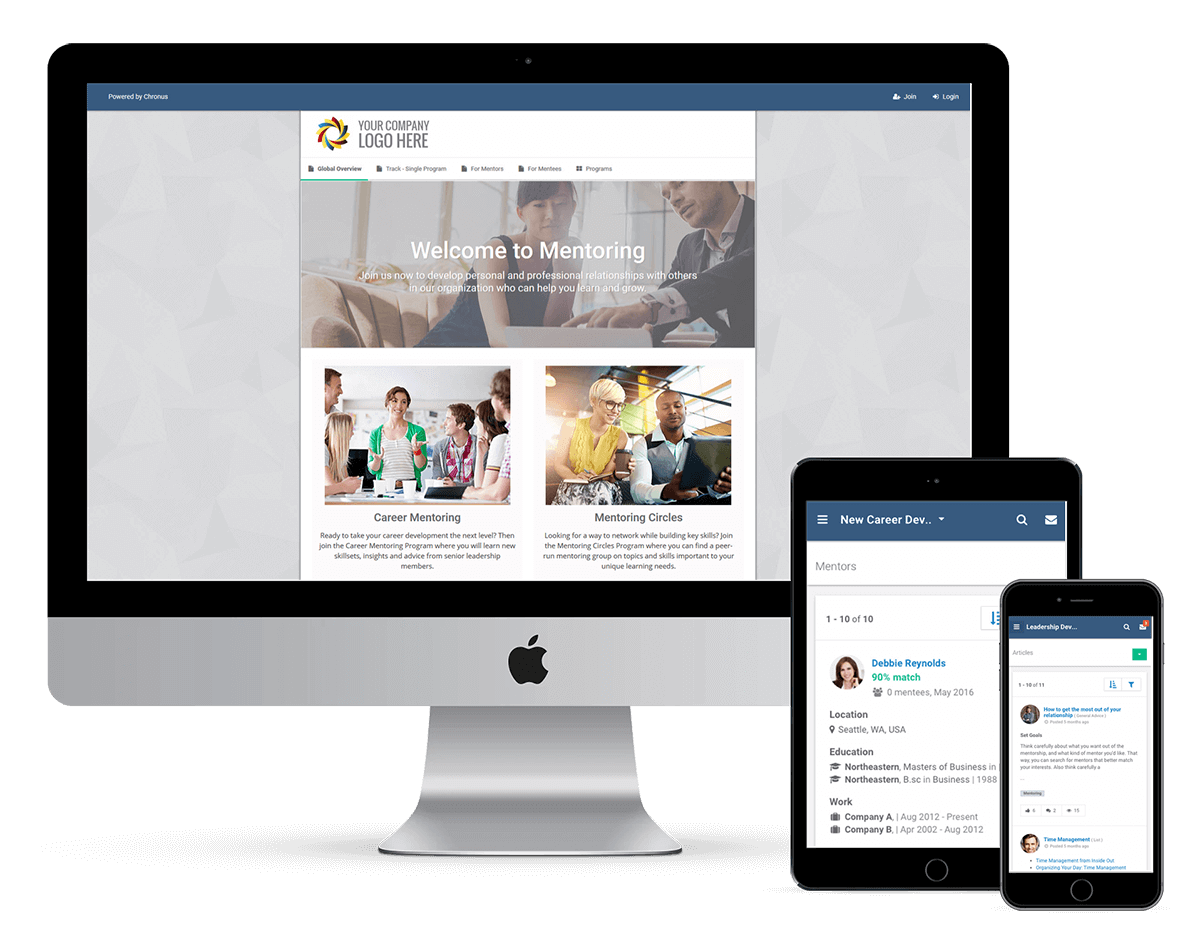Mentoring Programs Support Inclusion
Build a more creative and innovative workforce with inclusion and belonging initiatives that can make a company a top employer of choice.
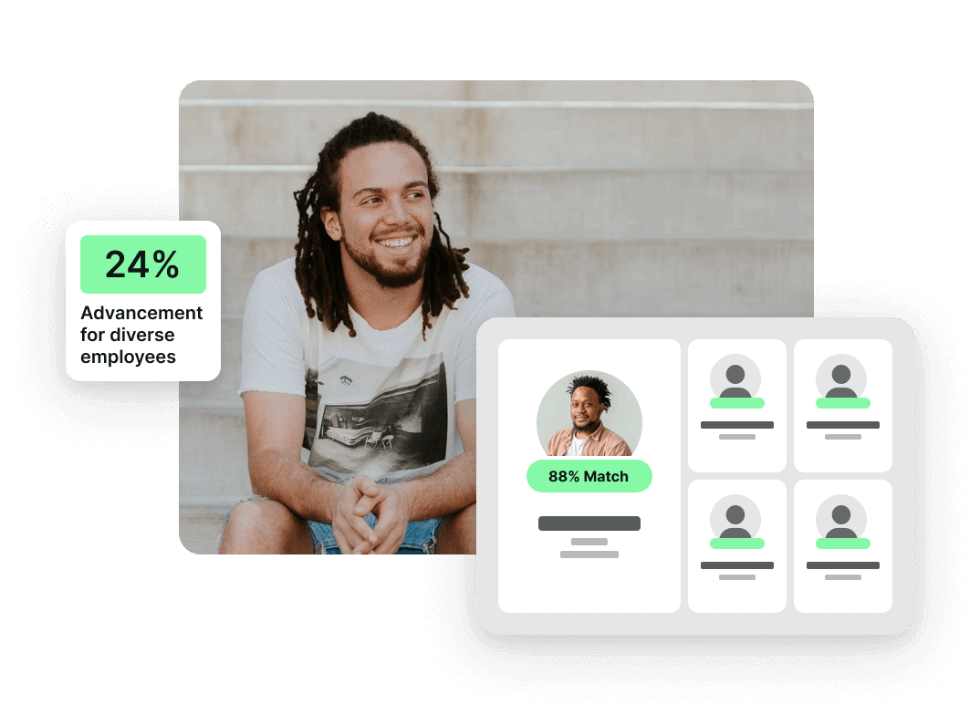
How to Promote Inclusive Mentoring
Inclusive practices are crucial to a company’s long-term success, and most leaders know it. But despite widespread evidence that investing in inclusion and belonging is a business imperative, progress has been slow.
25%
of organizations say their employees have experienced bias within the past two years.
– SHRM
66%
of employees say they don’t have sufficient resources to support DEI work.
– Culture Amp
1 in 4
Only one in four organizations deem their DEI initiatives to be mature.
– HR.com
The way to improve these statistics is to make inclusion a priority rather than treating it as an afterthought. Companies looking to improve and sustain belonging are turning to mentoring programs that are formalized and structured.
Recruit and enroll underrepresented employees
When it comes to informal mentoring, underrepresented employees can fall through the cracks — feeling like the program is not meant for or targeted to them. With Chronus, build intention into your program by automating and structuring your recruitment and enrollment process. The mentoring platform keeps admins and participants on track, providing accountability and structure so everyone feels included.
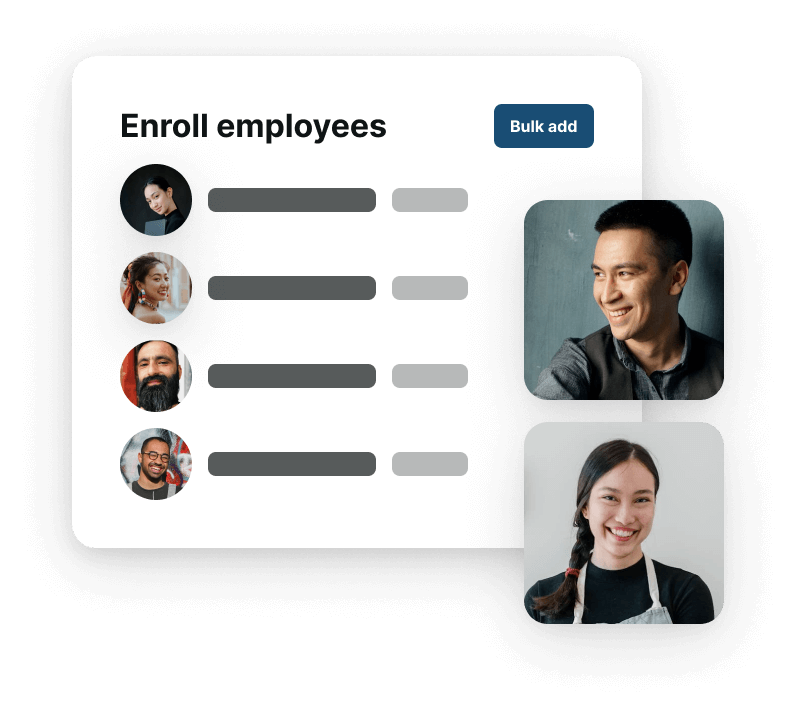
Remove bias and create belonging with diverse matching criteria
The Chronus mentoring platform allows you to customize your matching algorithm to meet the unique needs of the program. Elevate inclusive questions and criteria in order to match people across genders, ethnicities, nationalities, neurodiversity and beyond. Remove unconscious bias with features like Anonymous Matching and Hide Unanswered Question Fields.
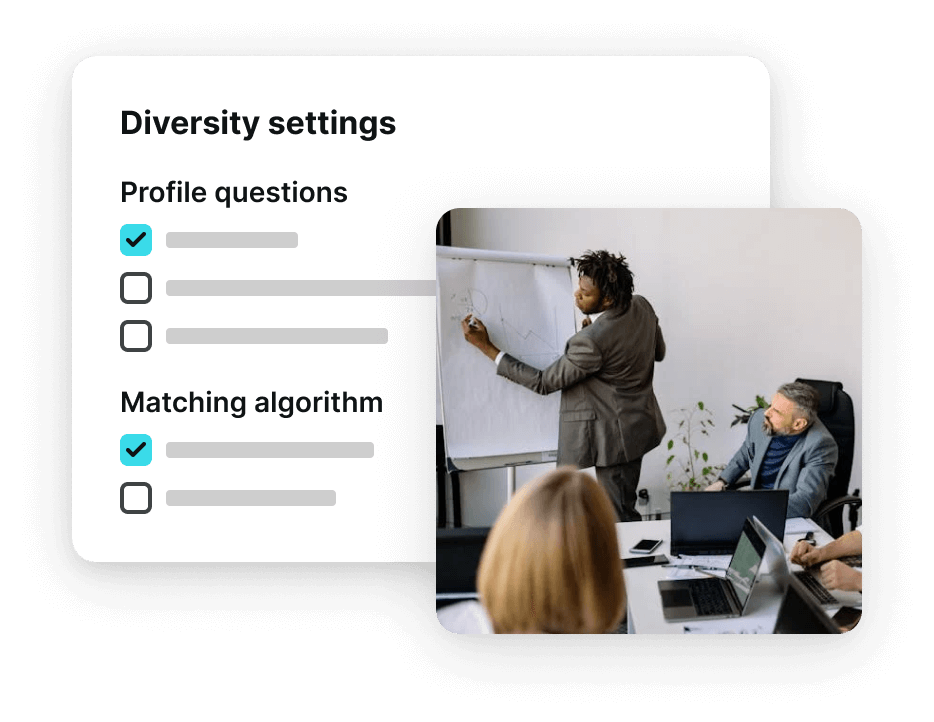
Track inclusion goal progress and improvements
Key reports and dashboards within Chronus help you optimize match rates while tracking program impact in the areas of retention, advancement, performance and more.
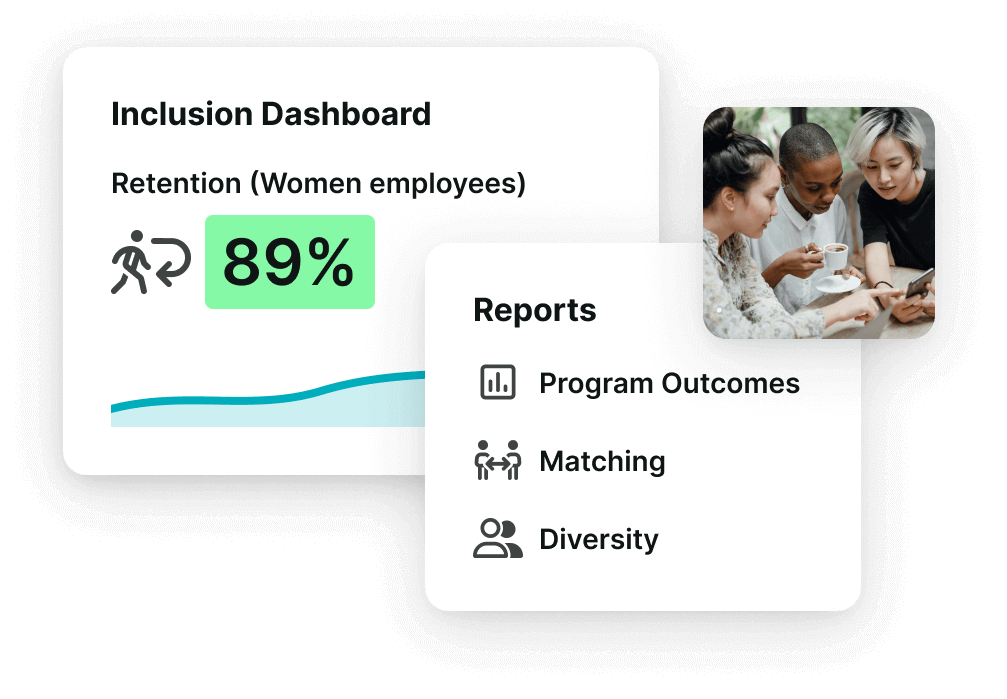
Ready to See Chronus Mentoring Platform Live?
Why Is Diversity Important In The Workplace
Mentoring enhances inclusive workplace culture by fostering knowledge sharing, skill development and networking opportunities across diverse backgrounds. It provides personalized support, breaks down biases, and encourages the exchange of diverse perspectives.
Through one-on-one relationships, mentoring builds connections and boosts engagement, ensuring all employees feel valued and empowered to succeed. Mentoring programs facilitate access to resources and opportunities, bridging gaps and leveling the playing field for individuals from underrepresented groups. By nurturing talent and creating a supportive environment for employees, mentoring cultivates a sense of belonging and inclusivity, driving collaboration, innovation and organizational success. Below are four benefits:
Increases Employee Retention
When talented employees are satisfied and engaged, companies can focus on doing what they do best—to produce the best product or service. However when employees are disengaged, turnover is often higher, which means increased costs and loss of productivity. Improving employee retention starts with building a better foundation for employee interaction, development and inclusion. Deloitte found companies with inclusive cultures reported 22 percent lower turnover than their less inclusive counterparts.
Fosters Leadership
Inclusive mentorship programs cultivate diverse leadership within teams. Harvard Business Review reports that mentoring programs notably enhance diversity in managerial positions, increasing representation of Black, Hispanic, and Asian American women, as well as Hispanic and Asian American men, by 9% to 24%. Industries abundant with college-educated nonmanagers, such as chemicals and electronics, witness boosts of 10% or more in the ranks of white women and Black men through mentoring programs.
Accelerates Advancement for Untapped Groups
With the aid of the Chronus mentoring platform, a prominent academic hospital has scaled its mentorship program from a few hundred to approximately 1,500 mentors. Throughout this expansion, the program has effectively monitored its positive influence on retention, employee development and inclusion metrics. Notably, the mentoring initiative has witnessed a doubling of advancement opportunities for non-white participants, highlighting its crucial role in fostering progress for minority and underrepresented groups.
Bolsters Recruitment Strategy
CNBC and Survey Monkey surveyed 8,233 employed adults and found 78 percent of workers found it “important” to work at an organization that prioritizes diversity and inclusion. Companies focused on building more inclusive companies are more likely to attract a wider talent pool during the application process. Existing employees will also be more likely to recommend the company to their peers and professional networks.
Builds Culture & Employee Wellbeing
Underrepresented and marginalized employees are at higher risks of burnout and exhaustion due to constant exposure to bias and microaggressions. Introducing a comprehensive inclusion strategy based on the needs of different groups of employees can go a long way in correcting that. Actively creating systems that reduce instances of discrimination can dramatically improve their well-being and company culture as a whole.
Types of Mentoring for Improving Belonging
Diversity Mentoring
This mentoring format pairs mentors and mentees in a one-to-one relationship aimed at engaging and developing underrepresented employee populations and can last 6-12 months. Diversity mentoring creates an environment of trust and support. It provides opportunities for employees who may have been left out of informal mentoring or sponsorship engagements previously, building a more inclusive workforce and talent pipeline.
Reverse Mentoring
Reverse mentoring partners an older, more experienced employee with a younger, less experienced newcomer. Companies can implement reverse mentoring in a one-to-one or group setting. The younger employee serves as the mentor, providing senior members of the organization with up-to-date information on the latest business technologies, technical skills, and workplace trends. Reverse mentoring can also play a vital role in encouraging inclusion within organizations.
Mentoring Circles
A mentoring circle is a peer-to-peer format that enables employees to find peers who share common interests or learning objectives, and develop together as a group. People from across departments and generations can learn from one another, expanding institutional knowledge. Employees can also build cross-functional relationships with people of similar or diverse backgrounds. Organizations can utilize mentoring circles for employee resource groups (ERGs) as a way to foster belonging. Employees of similar backgrounds can find a psychologically safe space for discussion, solidarity and support, where people can feel free to self-identify and be their authentic selves.
How to Start an Inclusive Mentorship Program
Inclusive mentorship programs are the key to assisting organizations in building a more diverse and inclusive workforce. However, knowing how to start an inclusive mentoring program can be easier said than done. Here are some tips for developing an impactful mentorship program for your workplace.
Determine your purpose
Ensure there are clear objectives and actionable goals that can be measured. Try tying specific topics like “encouraging more Black women leaders” to a specific goal, like comparing the number of mentees who receive promotions to the number of employees promoted without mentoring relationships.
Know your audience
Understand the groups you’re supporting and be sensitive to their needs. Include members of the employee groups you’re trying to serve in the design of the program. Follow up with regular roundtables to ensure the program is valuable, and gauge if there are ways to improve. In addition, don’t put all of the work on diverse employees. Do your part to review your organization and request feedback in order to build a mentoring program that enables and builds untapped employees rather than relying on them to teach and inform other employees.
Make the program “opt-in”
Make your mentorship program optional to join. Mentors and mentees should be excited and want to be active participants, especially since diversity mentoring requires careful thinking and active listening. Research shows that mandatory diversity training can have adverse effects within an organization. The same can be said for mandated mentoring. Make sure the benefits of the mentoring program are clear and incentivize the intended participants.
Recruit people
Building an inclusive mentorship program from scratch isn’t enough — you also need to promote it. Try sending customized emails and posting on internal message boards. Host informational sessions, encourage managers to inform people in team meetings, and have senior leaders talk about (and participate in) the program. And don’t be afraid to be direct: if you personally know of excellent mentor and mentee candidates, ask them to get involved.
Match the right mentors with the right mentees
Make sure to understand the preference and intent of your matching process. Some organizations prefer to match underrepresented employees with employees of a different background or demographic to build greater organizational empathy while expanding networks. On the other hand, some mentees might want to be matched with someone of a similar background (mentors with the same identity) to find and build a greater community within a company. Know what type of matching your organization is looking to enable. If unsure, refer back to the overall goals of your inclusive mentoring program.
Train your mentors and mentees
Basic mentor and mentee training contributes significantly to productive relationships. Educate them on how to best conduct meetings, offer feedback, and stay on track with goals. It’s also important in inclusive mentoring to train people about stereotypes and unconscious biases. It may be tempting to avoid discussing challenges or issues related to diversity or to dwell on them, but mentors and mentees need to be given guidance on how to approach sensitive topics in an empathetic manner.
While starting and managing an inclusive mentorship program can seem overwhelming, the potential benefits far outweigh any downsides.
Start Improving Inclusion & Belonging with Chronus
In order to see real change, organizations must invest in holistic solutions rather than check-the-box fixes. Mentoring establishes measures of accountability, fosters a truly inclusive culture and can exist across all stages of your employee experience. This powerful approach can move the needle in creating a more diverse, equitable and inclusive workforce.
With the help of Chronus mentoring software, you can help your underrepresented employees move within the organization, while also identifying improvements in retention, advancement and improvements to your company’s overall inclusion strategy and goals.
